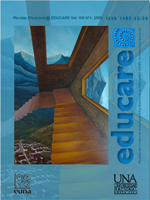Utopía universitaria
DOI:
https://doi.org/10.15359/ree.13-1.11Keywords:
university, teachers, students, utopiaAbstract
Universities are facing numerous changes, dilemmas and challenges in this new millennium, and it must get ready to face them by keeping a utopian thought. In this context all the actors of the university must insist on the right to envision and dream the future.
A utopian thought allows us to imagine a university that is different, one that can guide our activities as teachers, students, administrative personnel and authorities with a view to achieve the university dreamed by all of us.
This has motivated us to state our university utopia as a contribution to the reflection on the topics that involve the university.
References
de la Isla, C. (1991). La universidad: conciencia crítica. Estudios, Vol. VIII, Nº 25, 69-76.
Escotet, M. A. (1996). Universidad y devenir. Entre la certeza y la incertidumbre. Buenos Aires,
Argentina: Editorial IDEAS.
Gamboa, M. A. (2004). Presentación. La Universidad en el nuevo siglo. Reencuentro, Nº 041, s. pp.
Organización de las Naciones Unidas para la Educación, la Ciencia y la Cultura (UNESCO). (1998).
La Educación Superior del Siglo XXI, Visión y acción. Extraído de la Conferencia Mundial
sobre la Educación Superior, realizada en París, del 5 al 9 de octubre de 1998.
Prieto, D. (2005). La Educación Superior. Mendoza, Argentina: Editorial Centro Universitario.
Torres, C. M. (2004). Lo utópico de la Universidad. Reencuentro, Nº 041, s. pp.
Tünnermann, C. (1999). La universidad de cara al siglo XX. México D. F.: Editorial Praxis.
Downloads
Published
How to Cite
Issue
Section
License
1. In case the submitted paper is accepted for publication, the author(s) FREELY, COSTLESS, EXCLUSIVELY AND FOR AN INDEFINITE TERM transfer copyrights and patrimonial rights to Universidad Nacional (UNA, Costa Rica). For more details check the Originality Statement and Copyright Transfer Agreement
2. REUTILIZATION RIGHTS: UNA authorizes authors to use, for any purpose (among them selfarchiving or autoarchiving) and to publish in the Internet in any electronic site, the paper´'s final version, both approved and published (post print), as long as it is done with a non commercial purpose, does not generate derivates without previous consentment and recognizes both publisher's name and authorship.
3. The submission and possible publication of the paper in the Educare Electronic Journal is ruled by the Journal’s editorial policies, the institutional rules of Universidad Nacional and the laws of the Republic of Costa Rica. Additionally, any possible difference of opinion or future dispute shall be settled in accordance with the mechanisms of Alternative Dispute Resolution and the Costa Rican Jurisdiction.
4. In all cases, it is understood that the opinions issued are those of the authors and do not necessarily reflect the position and opinion of Educare, CIDE or Universidad Nacional, Costa Rica. It is also understood that, in the exercise of academic freedom, the authors have carried out a rogorous scientific-academic process of research, reflection and argumentation thar lays within the thematic scope of interest of the Journal.
5. The papers published by Educare Electronic Journal use a Creative Commons License:















 The articles published by Educare Electronic Journal can be shared with a Creative Commons License:
The articles published by Educare Electronic Journal can be shared with a Creative Commons License: 



